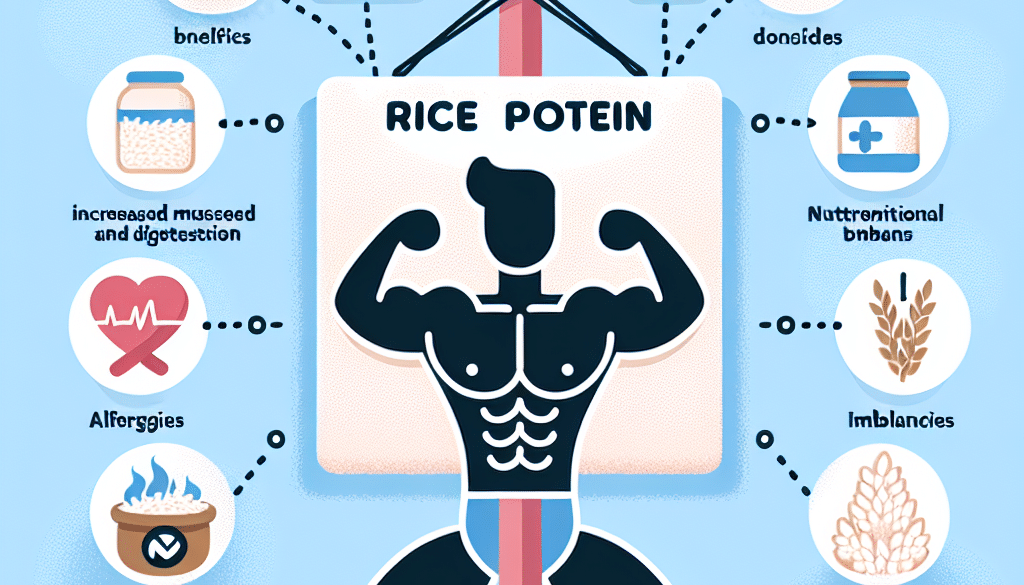Lis Rice Protein Good Or Bad For You?
-
Table of Contents
- Is Rice Protein Good or Bad for You? Unveiling the Truth
- Understanding Rice Protein
- The Benefits of Rice Protein
- Potential Drawbacks of Rice Protein
- Rice Protein vs. Other Protein Sources
- Case Studies and Research Findings
- How to Incorporate Rice Protein into Your Diet
- Conclusion: Making an Informed Choice
- Discover ETprotein’s High-Quality Protein Products
Is Rice Protein Good or Bad for You? Unveiling the Truth

Protein is a crucial macronutrient that plays a vital role in building muscle, repairing tissue, and producing enzymes and hormones. With the rise of plant-based diets and food allergies, many people are turning to alternative protein sources. Rice protein, a plant-based protein derived from brown rice, has gained popularity as a dietary supplement. But is rice protein good or bad for you? Let’s delve into the research to uncover the benefits and potential drawbacks of incorporating rice protein into your diet.
Understanding Rice Protein
Rice protein is extracted from brown rice and is often found in protein powders and supplements. It is a complete protein, meaning it contains all nine essential amino acids, although it’s typically lower in lysine compared to other protein sources. Rice protein is hypoallergenic, making it a suitable option for individuals with allergies to dairy, soy, or gluten.
The Benefits of Rice Protein
- Hypoallergenic: Rice protein is a great alternative for those with allergies or sensitivities to other protein sources like whey or soy.
- Plant-Based: It’s an excellent option for vegetarians, vegans, or anyone looking to reduce their meat consumption.
- Complete Protein: Despite being lower in some amino acids, rice protein still provides all the essential amino acids your body needs.
- Weight Management: Protein can help in weight management by promoting satiety and reducing appetite.
- Heart Health: Studies suggest that rice protein may help lower cholesterol levels, benefiting heart health.
- Easy Digestion: Rice protein is often easier to digest than other protein sources, making it a good choice for people with digestive issues.
Potential Drawbacks of Rice Protein
- Limited Research: Compared to whey or soy protein, there is less research on rice protein’s efficacy for muscle growth and recovery.
- Lysine Content: Rice protein is lower in the essential amino acid lysine, which is important for immune function and collagen production.
- Taste and Texture: Some may find the taste and texture of rice protein less appealing than other protein powders.
Rice Protein vs. Other Protein Sources
When comparing rice protein to whey, soy, or pea protein, it’s important to consider factors such as your dietary restrictions, taste preferences, and nutritional needs. Whey protein is known for its high biological value and rapid absorption, making it a favorite among athletes. Soy protein is a complete plant-based protein with potential heart health benefits. Pea protein is rich in iron and arginine, making it another strong plant-based contender.
Case Studies and Research Findings
Several studies have examined the effects of rice protein on muscle growth, exercise recovery, and overall health. A study published in the Journal of the International Society of Sports Nutrition found that rice protein isolate could provide similar benefits to whey protein in terms of body composition and exercise performance. Another study indicated that rice protein might help lower blood sugar levels and improve liver function.
How to Incorporate Rice Protein into Your Diet
Rice protein can be easily added to your diet through protein powders, bars, or shakes. It can also be used in baking or cooking to boost the protein content of meals and snacks. Here are some ideas:
- Add rice protein powder to smoothies or shakes for a post-workout boost.
- Use rice protein powder in baking recipes like muffins, pancakes, or protein bars.
- Mix rice protein into oatmeal or yogurt for a protein-packed breakfast.
Conclusion: Making an Informed Choice
In conclusion, rice protein offers several health benefits, particularly for those with dietary restrictions or preferences for plant-based nutrition. While it may not be as well-researched as whey or soy protein, current studies suggest it can be an effective protein source for muscle growth and overall health. As with any dietary supplement, it’s important to consider your individual needs and consult with a healthcare professional before making significant changes to your diet.
Discover ETprotein’s High-Quality Protein Products
If you’re interested in exploring rice protein and other plant-based protein options, ETprotein offers a range of high-quality products. Their selection includes organic rice protein, clear rice protein, and various other plant proteins, all characterized by a neutral taste, non-GMO, and allergen-free attributes. With purity levels over 98%, ETprotein caters to industries such as nutraceuticals, pharmaceuticals, cosmeceuticals, and food and beverage. To sample their products or learn more, contact sales(at)ETprotein.com today.
About ETprotein:
ETprotein, a reputable protein and L-(+)-Ergothioneine (EGT) Chinese factory manufacturer and supplier, is renowned for producing, stocking, exporting, and delivering the highest quality organic bulk vegan proteins and L-(+)-Ergothioneine. They include Organic rice protein, clear rice protein, pea protein, clear pea protein, watermelon seed protein, pumpkin seed protein, sunflower seed protein, mung bean protein, peanut protein, and L-(+)-Ergothioneine EGT Pharmaceutical grade, L-(+)-Ergothioneine EGT food grade, L-(+)-Ergothioneine EGT cosmetic grade, L-(+)-Ergothioneine EGT reference grade and L-(+)-Ergothioneine EGT standard. Their offerings, characterized by a neutral taste, non-GMO, allergen-free attributes, with L-(+)-Ergothioneine purity over 98%, 99%, cater to a diverse range of industries. They serve nutraceutical, pharmaceutical, cosmeceutical, veterinary, as well as food and beverage finished product distributors, traders, and manufacturers across Europe, USA, Canada, Australia, Thailand, Japan, Korea, Brazil, and Chile, among others.
ETprotein specialization includes exporting and delivering tailor-made protein powder and finished nutritional supplements. Their extensive product range covers sectors like Food and Beverage, Sports Nutrition, Weight Management, Dietary Supplements, Health and Wellness Products, and Infant Formula, ensuring comprehensive solutions to meet all your protein needs.
As a trusted company by leading global food and beverage brands and Fortune 500 companies, ETprotein reinforces China’s reputation in the global arena. For more information or to sample their products, please contact them and email sales(at)ETprotein.com today.












